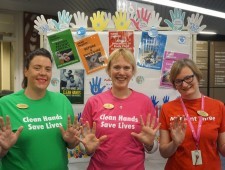Southern DHB handing out tips on good hand hygiene for Patient Safety Week
Fight germs, wash your hands is the message from Southern DHB to staff, patients and visitors during Patient Safety Week (4 – 10 November).
This year's theme is infection prevention and control with a focus on good hand hygiene, and during the week the DHB’s Infection, Prevention and Control (IPC) team will be raising awareness of how good personal hand hygiene can help to reduce of the spread of infections in our hospitals.
During the week staff and the public at Dunedin Hospital will be able to see how many germs are really on their hands, using glo germ gel, which highlights any dirt or bacteria under a UV light before and after washing their hands. They may be surprised to learn their hands are not as clean as they thought!
The test is among the range of information on display at the hospitals, explaining how good hand hygiene can help stop the spread of bugs and antibiotic-resistant infections.
Southern DHB IPC Charge Nurse Manager, Jo Stodart says, “Patient safety week is not just for our staff, it’s for everyone. We particularly want the public to support us by washing their hands properly, and at the right times to help reduce the spread of infection from the community into our hospitals. We also want our patients to know that it’s OK to ask members of staff who are providing their care to clean their hands before contact.
“Good hand hygiene is the simplest, most effective way to prevent germs that cause infections, and our aim during Patient Safety week is to increase understanding of the importance of handwashing as a way of preventing diseases and saving lives.”
The IPC team will also be visiting wards and departments across the DHB to remind staff about good hand hygiene techniques and messages will be posted on the Southern DHBs Facebook page as well as on TV screens in Dunedin Hospital. At Southland Hospital the children’s ward are holding a colouring competition, and at Dunedin Hospital on Tuesday and Thursday a hand hygiene word search will go out on patients’ meal trays.
“Optimising hand hygiene is a cornerstone of our infection prevention and control programme. Our staff, patients and visitors are integral in helping us in achieving the highest standards of hand hygiene,” says Southern DHB Quality and Risk Manager, Tina Gilbertson.
“Our message is to wash your hands often and in the correct way, and that hand hygiene isn’t just important in the hospital - it helps stop the spread of germs at home, at school and in the workplace.”
How to Clean Your Hands
Using soap and water
1. Wet hands using warm water
2. Add soap to make lather
3. Rub palms, back of hands, and between fingers
4. Rub for at least 15 seconds
5. Rinse hands and dry well
Using alcohol-based hand sanitisers
1. Apply to the palm of one hand (to use on BOTH hands)
2. Rub palms, back of hands, and between fingers
3. Rub until hands are dry (if it does not take at least 30 seconds, you may need to add more alcohol hand sanitiser)
When to wash our hands
We should wash our hands regularly each day, particularly:
- Before eating or touching food
- After using the toilet
- After blowing your nose, coughing or sneezing
- After touching animals
- After handling rubbish
- After changing a nappy
- Before and after touching a sick or injured person
- Before and after visiting a hospital ward.
About Patient Safety Week
New Zealand’s Patient Safety Week is coordinated by the Health Quality & Safety Commission (HQSC).
This year's Patient Safety Week (PSW) topic is infection prevention and control with a focus on good hand hygiene. Good hand hygiene helps stop the spread of bugs and antibiotic-resistant infections.
*Photograph of Dunedin Infection, Prevention and Control team members Carla Snow, Jo Stodart and Carol Jess
